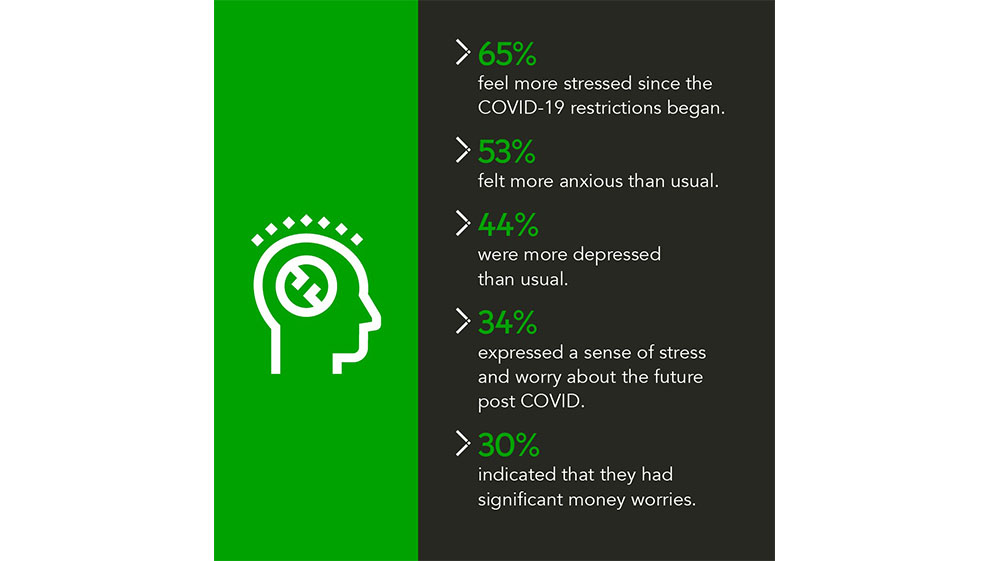9 tips to reclaim your social life as restrictions ease
- Overview
This year the conversations we have about stress will be more important than ever. Never in recent times have we collectively experienced the challenges to mental wellbeing brought about by a pandemic.
It’s just over a year since the first national lockdown to control the outbreak of COVID-19 was announced. According to research carried out by The Stress Management Society and Huawei:

The three main concerns were disconnection, uncertainty and a loss of control. As we finally start to emerge from a long winter in social hibernation, we want to help you find ways to ‘Regain Connectivity, Certainty and Control’ – the theme of Stress Awareness Month 2021.
Over the next four weeks we’ll be sharing tips on how you can build healthy habits in key areas of your life. The way in which we look after social connections, our mind, our work and our body has been shown to have a significant impact on mental fitness and feelings of stress. Each week of Stress Awareness Month we invite you to make a commitment to do something that strengthens one of these four areas.
Easing back into social engagements
As lockdown subsides, opportunities for resuming our social lives are opening up again. However, this can come with a range of sometimes conflicting emotions.
Although many of us are desperate to reconnect in person, it’s also natural to feel nervous at the prospect. After such a long period of social confinement, we may have become quite comfortable in our own company and space. So the thought of meeting up with people again may give us a sense of pressure or even anxiety.
Some of us may need to push ourselves to move out of our comfort zones, and overcome some initial awkwardness, before socialising starts to feel normal again. There may also be some anxiety about how to navigate situations where groups have different expectations or boundaries around social distancing and masks.
9 tips to reclaim your social life
Here are some tips you can use this week to help you regain connectivity, certainty, and control in your social interactions.
- Expect some social anxiety
It’s part of being human, especially since we’ve all been socially deprived. Like any other activity you haven’t done in a while, it will take some time to get back into the habit of interacting with others. You may worry that you’ve lost your social skills, or your confidence, but these will return as you get back into practice. - Don’t avoid social situations
Avoidance can often seem like an easy option, but it only reduces anxiety in the short term and actually makes the problem worse in the long term. Avoidance feeds anxiety, and has unhelpful consequences, such as missing out on social or work opportunities. Although it can sometimes be more comfortable to stay in a small and safe-feeling ‘bubble’, it’s not always what’s best for us. - Ease back in gradually
You may feel pressure to catch up with everyone straightaway. However, doing too much too soon may leave you feeling overwhelmed. There’s no need to rush – just as restrictions are being eased gradually, take time to ease yourself back into a social schedule that works for you. Start with maybe one or two activities a week, leaving time to relax and recuperate between each ‘new’ experience, whether it’s meeting up with friends again or going back into bars and restaurants as they open. That way it will feel less daunting as you adjust. - Planning can be helpful
If you’re nervous about meeting up socially again, planning can help you feel more in control of the situation. Try writing down a list of everything you think you might need to consider. Being prepared will help you feel reassured as you get back into a different routine. - Set clear boundaries
Remember that you have the ability to manage your environment outside of your home as well as inside. It can be helpful to tell people your boundaries in advance of any meeting, for example letting them know that seating arrangements will be socially distanced. - Don’t put too much pressure on yourself
People who feel more socially anxious tend to feel that way because they put a lot of pressure on themselves. This can be due to overthinking how they’ll be perceived by others in social situations, and fear that they don’t ‘measure up’ socially. It’s important to remember that social interactions aren’t a performance. - Be yourself
Having unrealistic expectations of yourself can be a fast track to social anxiety. You don’t have to be an amazing storyteller or fantastically entertaining, insightful or funny. It’s impossible to maintain such unrealistic standards, and more importantly, it’s unnecessary. Genuine connection is simply about being with other people. Most of us have had a very limited existence over the last few months, so sharing your authentic experiences of lockdown will help you connect more genuinely with others. It’s fine to simply share how bored you’ve been feeling! - Focus outwards
Try not to focus on your ‘social performance’ too much, or you may end up feeling self-conscious. Instead focus on what’s going on around you, and what other people are saying or doing. Remember that they’re likely to be nervous too – even those who seem really confident. And try not to analyse yourself either during or after the social event as you’re likely to focus on your perceived flaws rather than enjoying the moments of human connection. Finally, remember that no one can see how you’re feeling. Sometimes what’s happening in your body can feel magnified to you, but it’s unlikely others will notice. - Be kind to yourself
We can sometimes be self-critical about our social interactions, especially if we’re lacking in confidence. Make sure you speak to yourself with kindness and encouragement rather than being mean. Celebrate every achievement you’ve made in taking steps in the social world, no matter how small or insignificant it may feel.
How will you ease back into society?
This week you could pledge to:
- Plan a social schedule that works for you
- Build your social engagements gradually
- Reach out to your most trusted friends and talk about how you might be feeling
- Use kind and encouraging self-talk to help you as you step back into socialising.
Once you’ve decided, let us know on Instagram or Facebook how you’re going to start to reclaim your social life.
And watch this space as next week we’ll be discussing how we can find more peace of mind through good mental health habits.
Last updated Tuesday 13 April 2021
First published on Wednesday 7 April 2021

